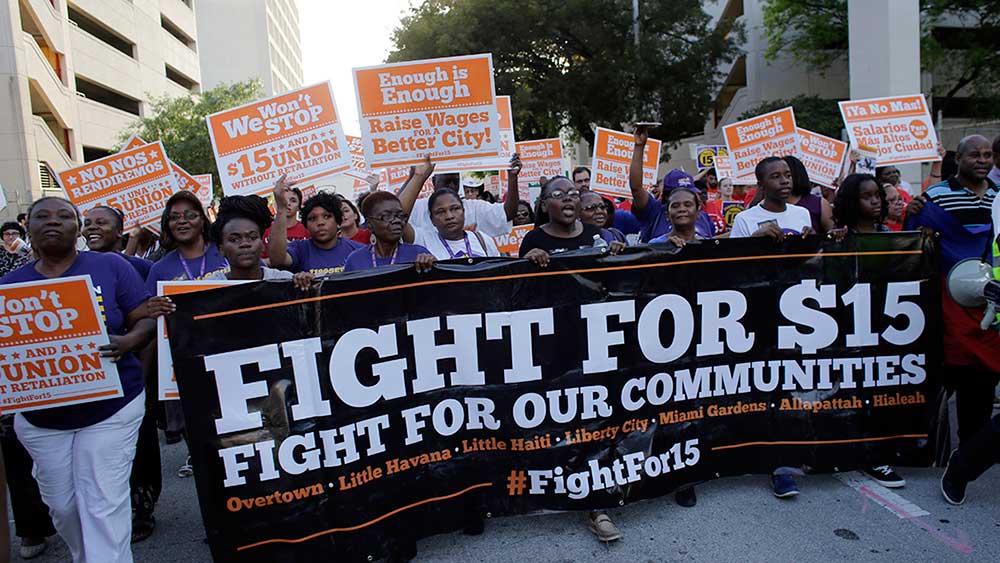doing what Republicans do...
http://www.addictinginfo.org/2016/0...mselves-passes-highest-minimum-wage-in-south/
Birmingham Tells Alabama GOP To Go F**k Themselves, Passes Highest Minimum Wage In The South
February 24, 2016 4:58 pm ·
Alabama Republicans were quickly trying to ban all cities and counties from raising the minimum wage, but one city gave the GOP the finger and beat them to the punch.
Birmingham, Alabama now has the highest minimum wage in the South after the city council voted 6-2 to make the new wage $10.10 per hour, despite Republican efforts to kill it at the state level.
After the city council originally voted in August for the wage hike to gradually increase to $10.10 by July 2017, Alabama state GOP Rep. David Faulkner quickly introduced a bill to ban it from going into effect, along with banning cities and counties from trying to raise the minimum wage for their citizens in the future.
It’s not a surprise, frankly. After all, Republicans are more in favor of eliminating the minimum wage entirely than they are of raising it to help struggling workers and families pay the bills and put food on the table without having to rely on federal and state assistance.
Indeed, Alabama currently ranks as one of the worst welfare states in the nation, taking in $2.46 for every dollar they send to the federal government. So, one would think that Republicans would be happy to make sure that workers are paid so they don’t have to rely on the government. Sadly, that isn’t the case.
But the Birmingham city council chose to vote again to implement the new wage increase immediately, thereby cutting Alabama Republicans off at the pass and flipping them off along the way.
“We need to make sure our citizens are taken care of and that we’re making decisions in their best interest,” said Council President Johnathan Austin.
The minimum wage in Alabama currently stands at $7.25, because the federal wage applies since
http://www.addictinginfo.org/2016/0...mselves-passes-highest-minimum-wage-in-south/
Birmingham Tells Alabama GOP To Go F**k Themselves, Passes Highest Minimum Wage In The South
February 24, 2016 4:58 pm ·
Alabama Republicans were quickly trying to ban all cities and counties from raising the minimum wage, but one city gave the GOP the finger and beat them to the punch.
Birmingham, Alabama now has the highest minimum wage in the South after the city council voted 6-2 to make the new wage $10.10 per hour, despite Republican efforts to kill it at the state level.
After the city council originally voted in August for the wage hike to gradually increase to $10.10 by July 2017, Alabama state GOP Rep. David Faulkner quickly introduced a bill to ban it from going into effect, along with banning cities and counties from trying to raise the minimum wage for their citizens in the future.
It’s not a surprise, frankly. After all, Republicans are more in favor of eliminating the minimum wage entirely than they are of raising it to help struggling workers and families pay the bills and put food on the table without having to rely on federal and state assistance.
Indeed, Alabama currently ranks as one of the worst welfare states in the nation, taking in $2.46 for every dollar they send to the federal government. So, one would think that Republicans would be happy to make sure that workers are paid so they don’t have to rely on the government. Sadly, that isn’t the case.
But the Birmingham city council chose to vote again to implement the new wage increase immediately, thereby cutting Alabama Republicans off at the pass and flipping them off along the way.
“We need to make sure our citizens are taken care of and that we’re making decisions in their best interest,” said Council President Johnathan Austin.
The minimum wage in Alabama currently stands at $7.25, because the federal wage applies since






